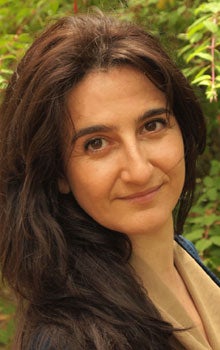
Molecular biologist earns NSF CAREER grant to study DNA repair
Irene Chiolo is all about integrity. Not only in her day to day work, but also in her research focus: understanding how cells keep their DNA intact, despite daily threats from the environment.
Chiolo, Gabilan Assistant Professor of Biological Sciences at USC Dornsife, focuses on DNA repair in heterochromatin, a dense gemish of chromosomal DNA and protein that features multiple repeats of short DNA sequences.
Those repeated sequences can be a real problem. If DNA breaks show up when the cell is duplicating its DNA during division and the cell fails to repair them, catastrophe looms.
“While repair failures in normal chromatin can lead to harmful mutations in specific genes,” she said, “incorrect repair within repetitive heterochromatic regions can trigger massive chromosome rearrangements causing cell death or genome instability.”
While a cell’s death, in most cases, won’t affect the body overall, genome instability is a leading cause of cancer and other diseases.

Irene Chiolo
To avoid these adverse outcomes, cells must have robust mechanisms to ensure heterochromatin is faithfully repaired during cell division. Chiolo recently received a Faculty Early Career Development (CAREER) Program award from the National Science Foundation to further her studies of these processes. CAREER awards are among the foundation’s most prestigious, supporting early-career faculty who can serve as academic role models in research and education and lead advances in their organization
The grant will allow her to develop and use new experimental methods with the fruit fly Drosophila, a commonly used subject for genetic research, to study what happens to heterochromatin when it undergoes repair.
Nearly 30 percent of the human genome is composed of heterochromatin surrounding centromeres, the bundles of DNA and protein that bind together pairs of chromosomes. Heterochromatin is a hotspot where defective repair of broken DNA strands can lead to harmful rearrangement of the genome.
Chiolo has previously uncovered unexpected mechanisms that cells use to help ensure proper repair takes place in heterochromatin. These sequences belonging to different chromosomes tend to cluster in a specific area of the nucleus, called the “heterochromatin domain.” Her earlier studies have shown that cells unravel strands with broken segments and thrust them outward, away from this domain, where they have room to be mended, then draw them back in safely.
She’s also shown that the nuclear membrane, a fatty layer that holds the DNA within the nucleus, aids in this repair.
With the CAREER award, she will use cutting-edge tools to break the DNA at specific, targeted sites coupled with powerful next-generation genomic sequencing technology to learn more about the repair process.
“This combination of approaches will enable the first high-resolution profiling of chromatin dynamics responsible for heterochromatic repair,” she said, shedding a finer light on the mechanisms that keep the genome healthy and stable.
The grant also will enable students, including undergraduates and high school students from underrepresented groups, to gain experience in the lab. “The project creates excellent educational opportunities for junior researchers to participate in training, teaching, mentoring and outreach activities, launching their careers in science while inspiring others.”
She hopes to use the award to advance understanding of genomic stability beyond USC Dornsife through an annual symposium gathering researchers to study the topic, as well.
“The symposium will enhance the dissemination of knowledge, open new networking, research and career opportunities for junior and senior scientists at colleges and universities across Southern California,” she said.